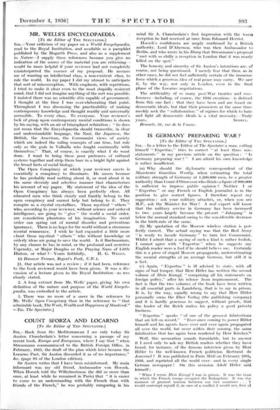COUNT SFORZA AND LOCARNO
[To the Editor of TUE SPECTATOR.]
Sac,—Back from the Mediterranean I see only today Sir Austen Chamberlain's letter concerning a passage of my recent biwk, Europe and Europeans, where I say that "when Stresemann communicated to the British Foreign Office, in February, 1925, the draft of the plan which later became the Locarno Pact, Sir Austen discarded it as of no importance," dre. (page 93 of the London edition).
Sir Austen writes that I haVe been misiaformed. My main informant was 'my old friend, Ambassador von Hoesch. When 'Hoesch told the Wilhelmstrasse (he did so more than once, at least while he remained in Paris) that " it is easier to . come to an• understanding with the French than with friends of the French," he was probably comparing in his mind Sir A. Chamberlain's first impression with the warm reception he had received at once from Edouard Herriot.
Hoesch's confidences are amply confirmed by a British authority, Lord D'Abernon, who was then Ambassador to Berlin, and who wrote in his Diary that Stresemann's proposal " met with so chilly a reception in London that it was nearly killed on the spot."
The honesty and sincerity of Sir Austen's intentions are, of course, not being questioned. I merely fear that then, as in other cases, he did not feel sufficiently certain of the immense force which a generous idea of real peace may carry. We saw it, by the way, not only in London, even in the final phase of the Locarno negotiations.
The artificiality of so many post-War treaties and con- ferences—including, of course, the 1936 creations—is derived from this one fact : that they have been and arc based on democratic ideals, but that their promoters at the same time meekly seek the " collaboration " of regimes for which to hate and fight all democratic ideals is a vital necessity.—Truly yours, SFORZA. Brussels, 31, rue de la Panne.




















































 Previous page
Previous page